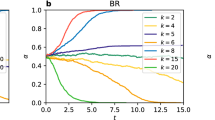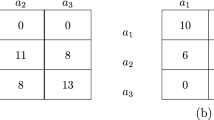Abstract
We analyze the relationships of the van den Elzen–Talman algorithm, the Lemke–Howson algorithm and the global Newton method for equilibrium computation by Govindan and Wilson. For two-player games, all three can be implemented as complementary pivoting algorithms. The algorithms by Lemke and Howson and by van den Elzen and Talman start at a pair of strategies: the first method at a pure strategy and its best reply, the latter anywhere in the strategy space. However, we show that even with the same starting point they may find different equilibria. Our second result is that the van den Elzen–Talman algorithm is a special case of the global Newton method, which was known only for the Lemke–Howson algorithm. More generally, the global Newton method implements the linear tracing procedure for any number of players. All three algorithms find generically only equilibria of positive index. Even though the van den Elzen–Talman algorithm is extremely flexible in the choice of starting point, we show that there are generic coordination games where the completely mixed equilibrium, which has positive index, is generically not found by the algorithm.
Similar content being viewed by others
References
Eaves B.C.: The linear complementarity problem. Manage Sci 17, 612–634 (1971)
Govindan S., Wilson R.: A global Newton method to compute Nash equilibria. J Econ Theory 10, 65–86 (2003a)
Govindan, S., Wilson, R.: Supplement to: a global Newton method to compute Nash equilibria. Accessed online at www.nyu.edu/jet/supplementary.html (2003b)
Harsanyi J.C.: The tracing procedure: a Bayesian approach to defining a solution for n-person noncooperative games. Int J Game Theory 4, 61–94 (1975)
Harsanyi J.C., Selten R.: A General Theory of Equilibrium Selection in Games. MIT press, Cambridge (1988)
Herings, P.J.-J., Peeters, R.: Homotopy methods to compute equilibria in game theory. Econ Theory (2009, this issue)
Hofbauer, J.: Some thoughts on sustainable/learnable equilibria. Paper presented at the 15th Italian Meeting on Game Theory and Applications, Urbino, Italy, July 9–12, 2003. Accessed online at http://www.econ.uniurb.it/imgta/PlenaryLecture/Hofbauer.pdf (2003)
Kohlberg E., Mertens J.-F.: On the strategic stability of equilibria. Econometrica 54, 1003–1037 (1986)
Lemke C.E.: Bimatrix equilibrium points and mathematical programming. Manage Sci 11, 681–689 (1965)
Lemke C.E., Howson J.T. Jr: Equilibrium points of bimatrix games. J Soc Indus Appl Math 12, 413–423 (1964)
Myerson R.B. et al.: Sustainable equilibria in culturally familiar games. In: Albers, W. (eds) Understanding Strategic Interaction: Essays in Honor of Reinhard Selten, pp. 111–121. Springer, Heidelberg (1997)
Ritzberger K.: Foundations of Non-Cooperative Game Theory. Oxford University Press, Oxford (2002)
Shapley, L.S.: A note on the Lemke–Howson algorithm. Mathematical Programming Study 1: Pivoting and Extensions, pp. 175–189 (1974)
Smale S.: A convergent process of price adjustment and global Newton methods. J Math Econ 3, 107–120 (1976)
van den Elzen A.H., Talman A.J.J.: A procedure for finding Nash equilibria in bi-matrix games. ZOR Methods Models Oper Res 35, 27–43 (1991)
van den Elzen A.H., Talman A.J.J.: An algorithmic approach toward the tracing procedure for bi-matrix games. Games Econ Behav 28, 130–145 (1999)
von Stengel, B.: Computing equilibria for two-person games, Chap. 45. In: Aumann, R.J., Hart, S. (eds.) Handbook of Game Theory, vol. 3, pp. 1723--1759. North-Holland, Amsterdam (2002)
von Stengel B., van den Elzen A.H., Talman A.J.J.: Computing normal form perfect equilibria for extensive two-person games. Econometrica 70, 693–715 (2002)
Author information
Authors and Affiliations
Corresponding author
Additional information
A preliminary version of this paper appeared online in Dagstuhl seminar proceedings 07471. The author is supported by the EPSRC and the LSE Research Studentship Scheme.
The author would like to thank Bernhard von Stengel for helpful comments and stimulating discussions.
Rights and permissions
About this article
Cite this article
Balthasar, A. Equilibrium tracing in strategic-form games. Econ Theory 42, 39–54 (2010). https://doi.org/10.1007/s00199-009-0442-4
Received:
Accepted:
Published:
Issue Date:
DOI: https://doi.org/10.1007/s00199-009-0442-4




